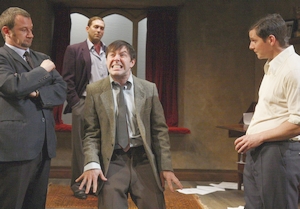SITE GUIDE
SEARCH
REVIEWS
REVIEW ARCHIVES
ADVERTISING AT CURTAINUP
FEATURES
NEWS
Etcetera and
Short Term Listings
LISTINGS
Broadway
Off-Broadway
NYC Restaurants
BOOKS and CDs
OTHER PLACES
Berkshires
London
California
New Jersey
DC
Philadelphia
Elsewhere
QUOTES
TKTS
PLAYWRIGHTS' ALBUMS
LETTERS TO EDITOR
FILM
LINKS
MISCELLANEOUS
Free Updates
Masthead
Writing for Us
A CurtainUp  London Review
London Review
 London Review
London ReviewThe Common Pursuit
|
I diminish what I most admire.— Humphry
|

James Dreyfus as Humphry, Ben Caplan as Martin, Reece Shearsmith as Nick and Nigel Harman as Peter
(Photo: Nobby Clark) |
The opportunity the playwright gives us is to contrast their youthful idealism, hopes and ambition with the reality of future events and thereby creating a sense of nostalgia for what might have been. Gray underlines this by returning to the Cambridge environment in his final scene. The common pursuit of the title is writing, as these men show their passion for poetry, publishing and other men's wives, or in Humphry's case his predilection for dangerous homosexual partners and unrealised promise.
The central character is Robert Portal as Stuart Thorne who has the original idea and who edits the magazine. Stuart's girlfriend, and later his wife, is a teacher, Marigold (Mary Stockley), the play's lone woman.
Martin Musgrave (Ben Caplan) wants to be involved on the production or business side of the magazine. Musgrave is very much a bystander, not one of those written about in Varsity, the university magazine, but an avid follower of those that are. The flamboyant Humphry (James Dreyfus), who goes on to be a Cambridge academic, will be an important contributor. Then there is Nick (Reece Shearsmith) a cross between a social butterfly and a praying mantis with his finger in many a media pie who makes a career in television arts programmes.
The first scene, nine years after Cambridge, sees Stuart struggling financially and avoiding phone calls from the landlord to whom he owes money, by pretending to be an Irishman. A few years later in 1981, Martin has taken over and the business is publishing books by some of their Cambridge contemporaries. Martin confesses to Stuart that he has been in love with Marigold for 13 years. The characters come together for the poignant funeral of one of them. Peter (Nigel Harman) is using his London friends to cover for absences from home where he is a lecturer.
The performances are pitch perfect as they all express the couture sense that was the corduroy jacket and unkempt hair but with more emphasis on how you think than what you look like. Two simple but authentic looking sets convey Stuart's rooms in Cambridge and his offices in London with a seamless sliding switch between the two. The Common Pursuit is a delicate and personal play that stays with you as you wryly reflect on your own youth and lost ambition. Fiona Laird's production is simple and straightforward but lets Simon Gray's wit and winsomeness shine through the medium of these intellectual hopes of their day. Stuart remains true to his ideals but is sold out by a man who betrays him only after years of devotion and longing. Nick is the opposite - shallow and opportunistic and cruelly very successful. Nigel Harman's character Peter gets tied up in marriage, children, plagiarism and serial adultery after marrying a woman that they all detest. Undoubtedly some of the characters mentioned can be identified by that Cambridge generation. There is a theatre critic and poet who lands the theatre job at the Sunday Times who is recognisable.
The Common Pursuit is a must-see for the literary university generation of the late sixties and anyone else who wants to reflect on what might have been: lost youth, lost ideals and women you have lost and what endures.
|
The Common Pursuit
Written by Simon Gray Directed by Fiona Laird Starring: James Dreyfus, Robert Portal, Nigel Harman With: Ben Caplan, Mary Stockley, Reece Shearsmith Design: Anthony Lamble Lighting: Hartley TA Kemp Sound: Sebastian Frost for Orbital Running time: Two hours minutes with one interval Box Office: 020 7907 7060 Booking to 20th July 2008 Reviewed by Lizzie Loveridge based on 30th May 2008 performance at The Menier Chocolate Factory, Southwark Street, London SE1 (Rail/Tube: London Bridge) |
|
REVIEW FEEDBACK Highlight one of the responses below and click "copy" or"CTRL+C"
Paste the highlighted text into the subject line (CTRL+ V): Feel free to add detailed comments in the body of the email and state if you'd like your comments published in our letters section. |
|
London Theatre Tickets Lion King Tickets Billy Elliot Tickets Mighty Boosh Tickets Mamma Mia Tickets We Will Rock You Tickets Theatre Tickets |




